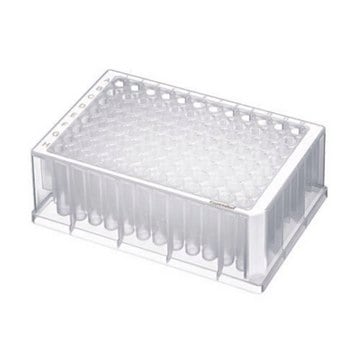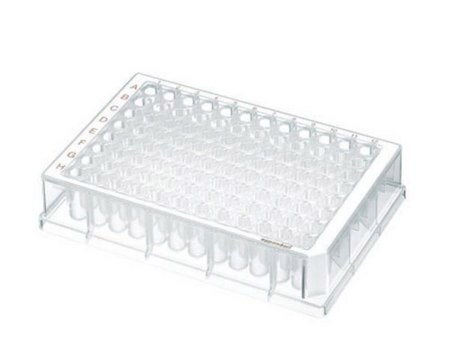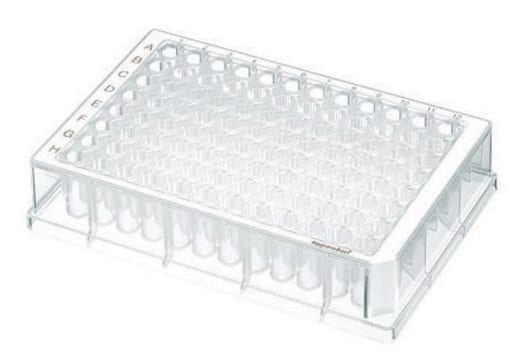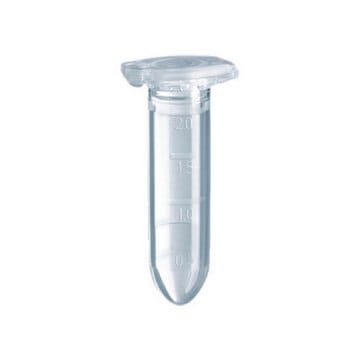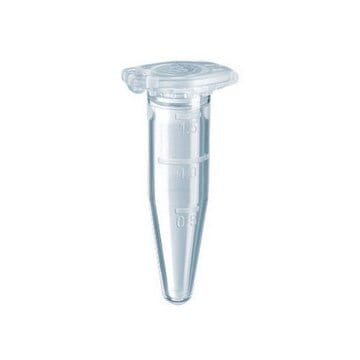EP951032921
Eppendorf® Deepwell plates, Protein LoBind, 96 wells
yellow plate, conical bottom, colorless wells, capacity 500 μL, pkg of 20 ea (5 bags × 4 plates)
Sign Into View Organizational & Contract Pricing
All Photos(1)
About This Item
UNSPSC Code:
41106300
material:
clear wells
colorless wells
conical bottom
polypropylene
yellow plate
colorless wells
conical bottom
polypropylene
yellow plate
capacity:
500 μL
well volume:
1000 μL
sterility:
non-sterile
binding type:
low binding surface
feature:
lid: no
Recommended Products
material
clear wells
colorless wells
conical bottom
polypropylene
yellow plate
sterility
non-sterile
feature
lid: no
packaging
pkg of 20 ea (5 bags × 4 plates)
manufacturer/tradename
Eppendorf® 951032921
capacity
500 μL
well volume
1000 μL
color
yellow border
suitability
suitable for (protein analysis)
suitable for PCR
binding type
low binding surface
Looking for similar products? Visit Product Comparison Guide
Related Categories
General description
Deepwell Plate 96/1000 µL, Protein LoBind, wells colorless, 1,000 µL, PCR clean, yellow, 20 plates (5 bags × 4 plates)
- Eppendorf LoBind material ensures excellent sample recovery for improved assay results
- Free of surface coating (e.g., silicone) to minimize the risk of sample interference
- Lot-certified PCR clean purity grade: free of human DNA, DNase, RNase and PCR inhibitors
- Available in tube, microplate, and deepwell plate formats for easy-up scaling
- Unique OptiTrack® matrix: 30 % faster sample identification and fewer pipetting errors
- RecoverMax well design: optimized well geometry for minimal remaining/dead volume and excellent mixing properties
- Raised well rims and a smooth surface ensure reliable sealing in plates
Features and Benefits
- Eppendorf LoBind material ensures optimized sample recovery for improved assay results
- Free of surface coating (e.g. silicone) to minimize the risk of sample interference
- Lot-certified PCR clean purity grade: free of human DNA, DNase, RNase and PCR inhibitors
- Available in tube, microplate, and deepwell plate formats for easy-up scaling
- High-contrast Unique OptiTrack® matrix: up to 30 % faster sample identification and fewer pipetting errors
- RecoverMax® well design: optimized well geometry for minimal remaining/dead volume and excellent mixing properties
- Raised well rims and a smooth surface ensure reliable sealing
Legal Information
Eppendorf is a registered trademark of Eppendorf AG
OptiTrack is a registered trademark of Eppendorf AG
RecoverMax is a registered trademark of Eppendorf AG
Choose from one of the most recent versions:
Certificates of Analysis (COA)
Lot/Batch Number
Sorry, we don't have COAs for this product available online at this time.
If you need assistance, please contact Customer Support.
Already Own This Product?
Find documentation for the products that you have recently purchased in the Document Library.
Kelly Hodge et al.
Journal of proteomics, 88, 92-103 (2013-03-19)
Mass spectrometry, in the past five years, has increased in speed, accuracy and use. With the ability of the mass spectrometers to identify increasing numbers of proteins the identification of undesirable peptides (those not from the protein sample) has also
Cláudia P Grou et al.
The Journal of biological chemistry, 283(21), 14190-14197 (2008-03-25)
According to current models of peroxisomal biogenesis, newly synthesized peroxisomal matrix proteins are transported into the organelle by Pex5p. Pex5p recognizes these proteins in the cytosol, mediates their membrane translocation, and is exported back into the cytosol in an ATP-dependent
Hongchang Qu et al.
Immunobiology, 218(4), 496-505 (2012-07-17)
Therapeutic modulation of the complement system has become increasingly important in line with the growing recognition of the role of complement in numerous diseases. Compstatin, a peptidic inhibitor that acts at the central level of the complement cascade, is currently
Arzu Umar et al.
Proteomics, 7(2), 323-329 (2006-12-14)
Proteomics assays hold great promise for unraveling molecular events that underlie human diseases. Effective analysis of clinical samples is essential, but this task is considerably complicated by tissue heterogeneity. Laser capture microdissection (LCM) can be used to selectively isolate target
Steven J Bark et al.
Journal of proteome research, 6(11), 4511-4516 (2007-09-14)
Differential recovery of peptides due to nonspecific adsorption can seriously compromise reproducibility and quality of proteomic data for peptide analyses by liquid chromatography-mass spectrometry (LC-MS). This study demonstrates large variations in reproducibility and quantitation of LC-MS data for peptides derived
Our team of scientists has experience in all areas of research including Life Science, Material Science, Chemical Synthesis, Chromatography, Analytical and many others.
Contact Technical Service